Revolutionizing Healthcare: AI Medical Tools Enhancing Diagnosis and Treatment
In the realm of healthcare, a new wave of AI Medical Tools is transforming the landscape, enhancing the way clinicians diagnose and treat patients. From the efficient medical scribe, Freed, lightening the paperwork load for medical professionals to innovative platforms like Mutuo Health's AutoScribe, revolutionizing the medical documentation process, these tools are reshaping the way healthcare is delivered. With advancements like DeepScribe's real-time patient encounter processing and Heidi's style-mirroring AI-powered notes, the focus is shifting towards patient care rather than administrative tasks. Join us on a journey through the world of AI Medical Tools, where technology and healthcare converge to bring unprecedented efficiency and accuracy to medical practices.
1. Freed
Freed stands out in the landscape of AI Medical Tools, offering a lifeline for clinicians swamped with the administrative burden of medical documentation. By harnessing the power of AI, Freed serves as an efficient medical scribe, transcribing patient visits into SOAP notes and after-visit summaries, thereby allowing healthcare professionals to dedicate more time to patient care and less to paperwork.
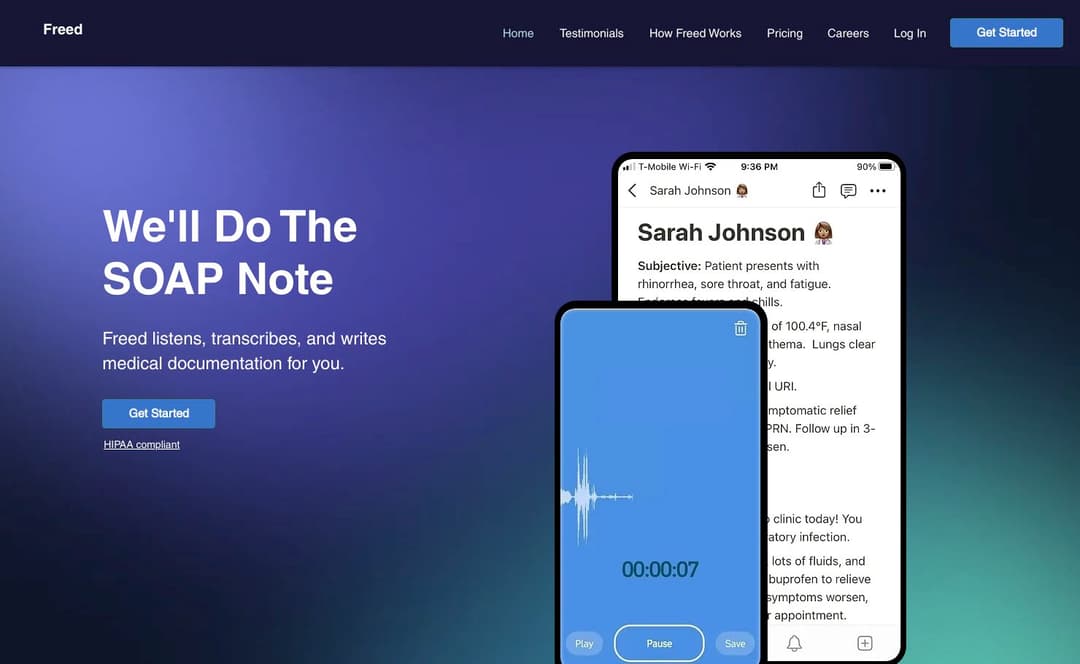
Pricing:
Free: Offers 10 free visits without requiring a credit card.
$99/month: Unlimited visits for clinicians aiming for extensive use.
Group: Custom pricing for clinics or groups, offering license management and organization-wide BAA.
Features:
Automated transcription of patient visits into SOAP notes.
Generation of after-visit summaries written in the clinician's style.
Self-learning capabilities to adapt to the clinician’s preferences.
Efficient one-click integration with EHR systems.
Pros:
Significant time savings on administrative tasks.
Customization to clinician’s style and preferences.
HIPAA-compliant data handling and security.
Cons:
Dependence on internet connectivity for optimal performance.
Potential learning curve for less tech-savvy users.
2. Tali
In the realm of healthcare, Tali emerges as a beacon of innovation, harnessing the power of AI to redefine medical documentation. Tali's suite of AI Medical Tools, including an AI Ambient Scribe and Medical Dictation, offers a transformative solution for medical professionals. By automating the laborious task of documentation, Tali allows healthcare providers to focus on what truly matters - patient care. This intelligent assistant not only streamlines administrative processes but also enhances the accuracy of medical records, ensuring that every detail is captured with precision and efficiency.
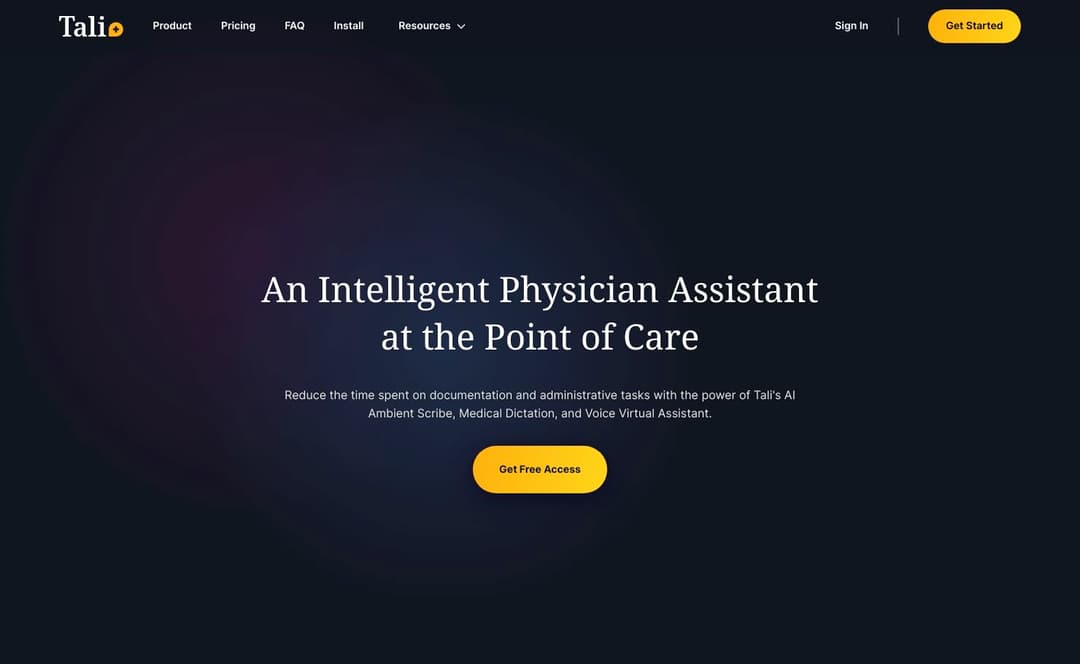
Pricing:
Tali's pricing details were not explicitly available on the website. Prospective users are encouraged to contact Tali directly for the most current pricing information.
Features:
AI Ambient Scribe for automated documentation
Highly accurate Medical Dictation
Integration with major EHR systems in Canada and the U.S.
Medical Search for reliable drug dosage and medical information
Voice Virtual Assistant for common EHR commands
Seamless installation and use atop any EHR system
Support for a wide range of medical specialties
Pros:
Saves significant time on documentation
Improves the accuracy of medical records
Facilitates better physician-patient interaction
Supports clinical decision-making with up-to-date information
Reduces physician burnout by alleviating documentation stress
Cons:
May require initial adaptation for physicians and staff
Dependence on technology raises concerns about data security, albeit Tali is highly secure and compliant
Integration and compatibility challenges with specific EHR systems may arise
3. Chartnote
Chartnote is an innovative platform at the intersection of healthcare and technology, specifically tailored for medical professionals. It's part of a growing trend of AI Medical Tools designed to streamline and revolutionize the process of medical documentation. By leveraging advanced AI, voice recognition, and smart templates, Chartnote aims to alleviate the burden of paperwork for healthcare providers, allowing them to focus more on patient care and less on administrative tasks.
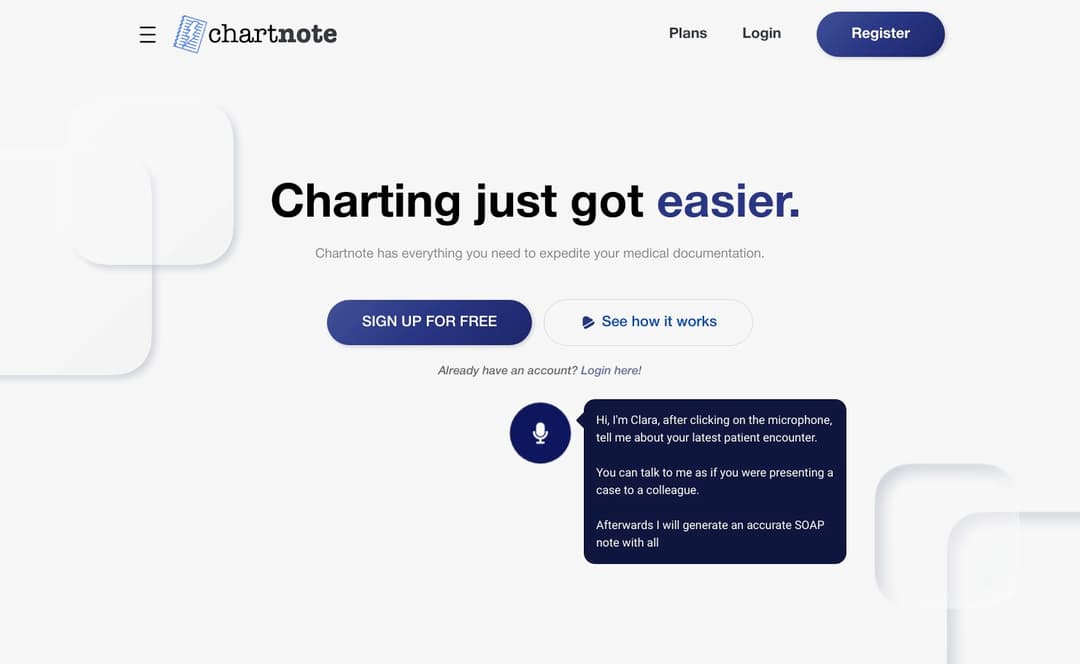
Pricing:
Specific pricing details for Chartnote are not available in the provided sources. Typically, such tools offer various plans based on features and usage. It's recommended to visit the official website or contact the provider for the most accurate and current pricing information.
Features:
Advanced AI voice-recognition with high accuracy and accent-agnostic capabilities.
Mobile app integration, allowing smartphones to be used as microphones for dictation.
HIPAA and GDPR compliant cloud-based solution.
Compatibility with EHRs, facilitating easy transfer of notes.
Voice command support for inserting text snippets and templates.
Pros:
Enhances documentation efficiency with AI and voice recognition.
Facilitates mobile and remote documentation.
Reduces time spent on administrative tasks, focusing more on patient care.
Cons:
Dependency on technology and internet connectivity.
Requires adaptation and learning for users not familiar with voice recognition software.
4. Mutuo Health
Mutuo Health shines in the realm of healthcare innovation with its flagship product, AutoScribe, an AI Medical Tool designed to transform the medical documentation process. This cutting-edge digital assistant uses artificial intelligence to transcribe patient-clinician dialogues into accurate clinical notes, allowing healthcare professionals to dedicate more time to patient care rather than paperwork. By integrating state-of-the-art AI technology, Mutuo Health aims to enhance the efficiency of patient data capture during clinical interactions, offering a solution that brings the joy back to medicine.
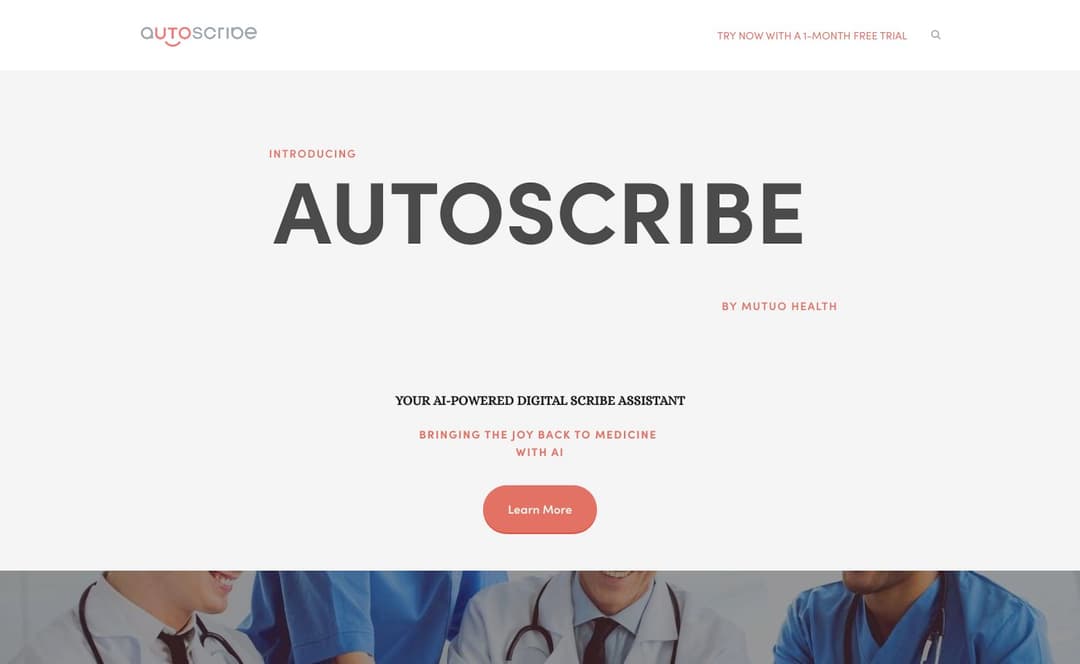
Pricing:
Mutuo Health offers a 1-month free trial for new users to experience the benefits of AutoScribe. For detailed pricing beyond the trial, interested parties are encouraged to contact Mutuo Health directly.
Features:
Transcription of clinician-patient dialogues into clinical notes
Integration with electronic medical records (EMR)
Customizable note templates to match clinicians' writing styles
Real-time generation of accurate clinic notes, saving time for healthcare professionals
Pros:
Saves significant time in clinical documentation
Improves the quality of patient-clinician interactions
Offers customizable templates to suit individual clinician preferences
Cons:
Adoption requires initial learning and integration effort
Dependent on the accuracy of speech recognition in varied clinical environments
5. DeepScribe
DeepScribe stands at the forefront of AI Medical Tools, transforming healthcare documentation with its advanced AI medical scribe. Designed to alleviate the administrative burdens on clinicians, DeepScribe's innovative technology captures and processes patient encounters in real-time. By filtering out irrelevant conversation and focusing on key medical information, it produces comprehensive, EHR-ready notes. This not only saves precious time but also allows healthcare professionals to dedicate more attention to patient care, embodying a future where technology and healthcare converge to improve both clinician well-being and patient experiences.
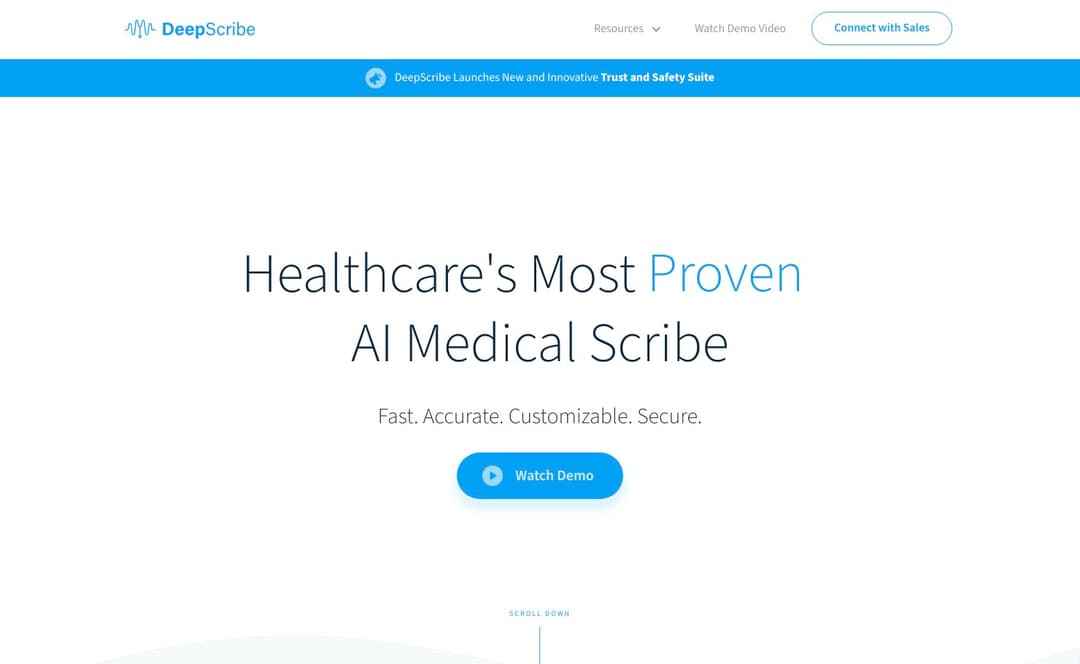
Pricing:
DeepScribe's pricing details are not explicitly listed on their website. Interested parties are encouraged to contact their sales team directly for tailored pricing information.
Features:
Advanced Speech Recognition for capturing natural conversations with high accuracy.
Ambient Capture that records patient visits in the background without intrusion.
Telemedicine Compatibility, facilitating documentation for remote consultations.
Seamless EHR Integration, allowing AI-generated notes to sync directly with various electronic health record systems.
Enterprise-Grade Security, including HIPAA compliance, end-to-end encryption, and strict access controls.
Pros:
Significant reduction in documentation time, with a reported 75% decrease.
Ability to see additional patients daily due to time saved on documentation.
Improved clinician well-being by reducing stress and administrative workload.
Highly accurate and customizable AI-powered documentation.
Cons:
Pricing and cost considerations for small practices or individual providers may be a barrier.
Potential learning curve for integrating and optimizing the system within existing workflows.
Dependency on the system's accuracy and the need for occasional manual corrections or oversight.
6. Scribeberry
Scribeberry is an innovative AI Medical Tool designed for healthcare professionals. It offers automated medical scribing, charting, and documentation services, leveraging large medical language models and artificial intelligence. Scribeberry ensures HIPAA and PIPEDA compliance, catering to a wide range of healthcare providers including family doctors, surgeons, and specialists.
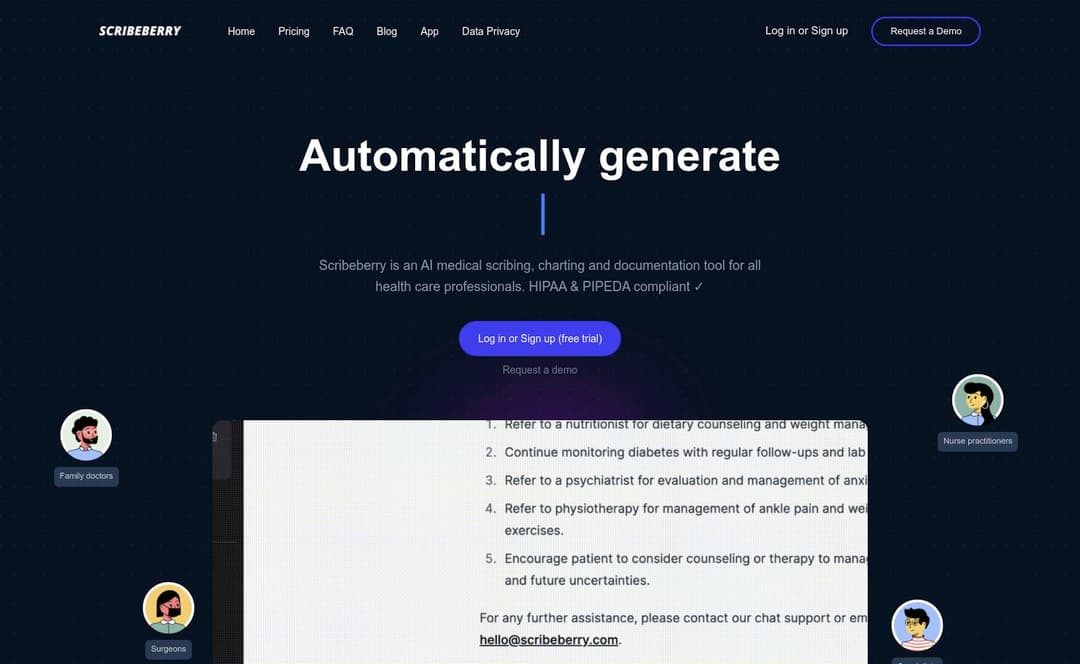
Pricing:
Pro Plan: $99/month or $999/year, featuring unlimited daily uses, advanced features like ambient scribes and medical templates.
Free Plan: $0/month, offering 20 uses per month and basic features for trial purposes.
Enterprise Plan: Custom pricing for large clinics and hospitals, including all Pro features plus custom integrations and templates.
Features:
Transcription of audio files in various formats.
Customizable medical templates.
Support for multilingual transcriptions.
Export to PDF and email capabilities.
Quick action menu for efficient usage.
Ambient scribes for telehealth.
Pros:
Advanced dictation and transcription capabilities.
Reduces time spent on charting and documentation.
Supports multiple devices and audio formats.
Customizable outputs and templates.
Cons:
No direct integration with EMR systems.
Free version has limited features.
Notes don't sync across devices.
Requires manual data transfer to EMR.
7. Heidi
Heidi stands out in the realm of AI Medical Tools, offering unparalleled assistance to healthcare professionals. This AI-powered medical scribe is designed to write perfect notes, mirroring the user's style, while halving documentation time for a faster, safer practice. Trusted across 13+ countries and HIPAA Compliant, Heidi aims to streamline clinical workflows, ensuring healthcare staff can focus more on patient care than paperwork.

Pricing:
Free forever plan includes unlimited notes, custom templates, basic processing, 20 x AI prompts, and basic customer support.
Heidi Pro offers a 7-day free trial followed by $69 USD/mo, featuring unlimited notes and dictation, priority processing, unlimited AI document generation, and priority customer support.
Features:
Write perfect notes in the user's style
Halve documentation time for faster, safer practice
Trusted and HIPAA Compliant in 13+ countries
Generate visit summaries and documents
Custom templates for personalized note-taking
Priority processing and AI document generation for Pro users
Pros:
Free version available with essential features
Reduces documentation time significantly
Supports custom templates for personalized care
HIPAA Compliant and trusted internationally
Cons:
Limited AI prompts in the free version
Priority features reserved for Pro users
8. Nabla Copilot
Nabla Copilot is revolutionizing the healthcare sector with its cutting-edge AI Medical Tools, designed to enhance the efficiency and accuracy of medical documentation. This innovative platform supports healthcare professionals by automating clinical note-taking, thus allowing them to focus more on patient care and less on paperwork.
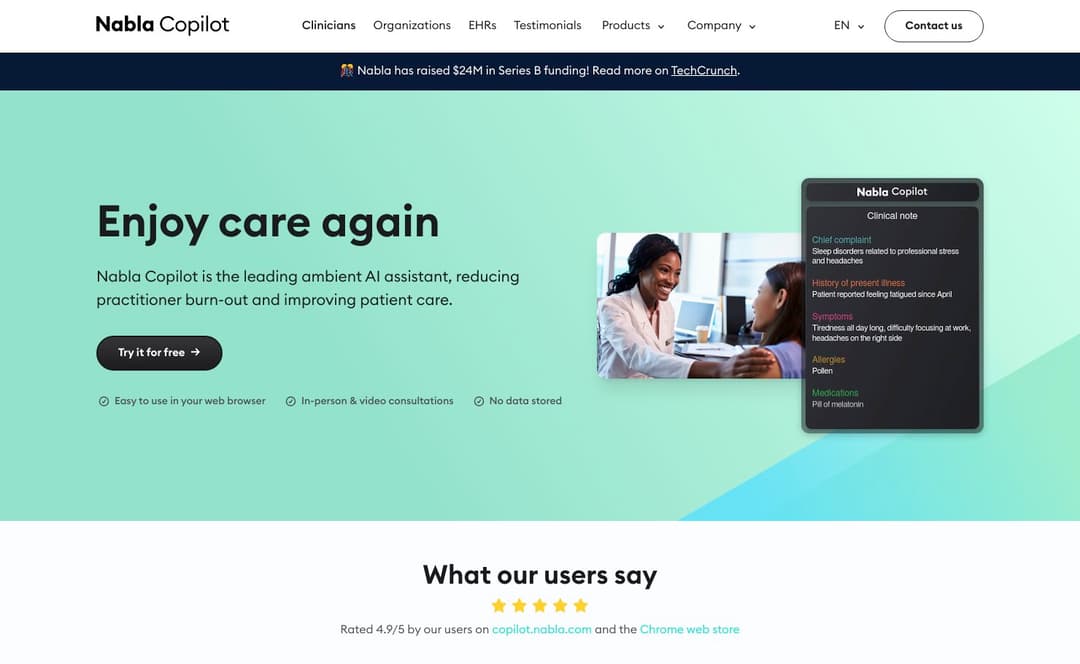
Pricing:
Nabla Copilot is available at $119 per seat per month.
Features:
Real-time clinical note generation
Customizable note templates tailored to various medical specialties
Direct API integration with existing healthcare tech stacks
Support for asynchronous care models, including chats and voice notes
Automatic medical code extraction from consultation notes
Stringent data privacy with no user data storage
Pros:
Significantly reduces time spent on clinical documentation
Integrates seamlessly with existing healthcare systems
Supports a wide range of medical specialties with customizable templates
Ensures high data privacy and security standards
Cons:
Requires adaptation and learning for optimal use
Dependent on the quality of audio input for note accuracy
9. Upheal
Upheal is a trailblazer in AI Medical Tools, revolutionizing the way mental health professionals manage their practices. By automating progress notes and offering deep analytical insights, Upheal empowers therapists to focus more on patient care rather than administrative tasks. Its seamless integration into existing workflows, along with HIPAA compliance, ensures both convenience and security, making therapy management more efficient and effective.
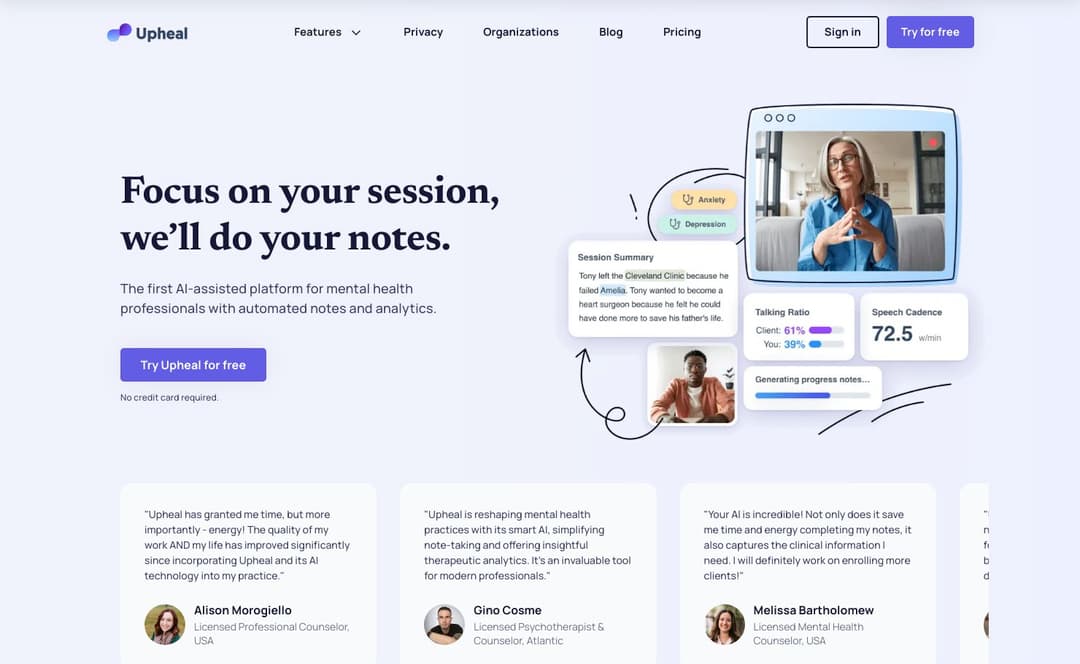
Pricing:
Starter: $49/month for 50 session notes, manual session uploads, and basic analytics.
Premium: $99/month includes everything in Starter plus 100 session notes, session transcript, and Zoom video-calling.
Unlimited: $149/month offers unlimited session notes, video calling with AI assistant, and advanced analytics.
Features:
AI-generated progress notes and insights for enhanced session documentation.
HIPAA-compliant video calling and secure data handling for client confidentiality.
Integration with EHR, Google Calendar, and Zoom for streamlined operations.
Advanced session analytics offering insights into speech patterns and therapy effectiveness.
Customizable treatment plans with SMART goals for targeted client progress.
Pros:
Saves time on administrative tasks, allowing more focus on client care.
Enhances therapy sessions with AI-driven insights and analytics.
Flexible integration with existing tools and workflows.
Cons:
May require a learning curve to fully integrate into practice.
Dependence on technology might not suit all therapy approaches.
10. Sully
Sully is an AI Medical Tool designed to serve as an AI Copilot for doctors. Its core purpose is to significantly enhance healthcare by expanding doctors' capabilities, thus saving more lives. It specifically targets Primary Care Doctors, particularly those working in or owning small clinics. By leveraging AI, Sully aims to drastically reduce the administrative workload of doctors, a task that currently consumes about half of their working hours.
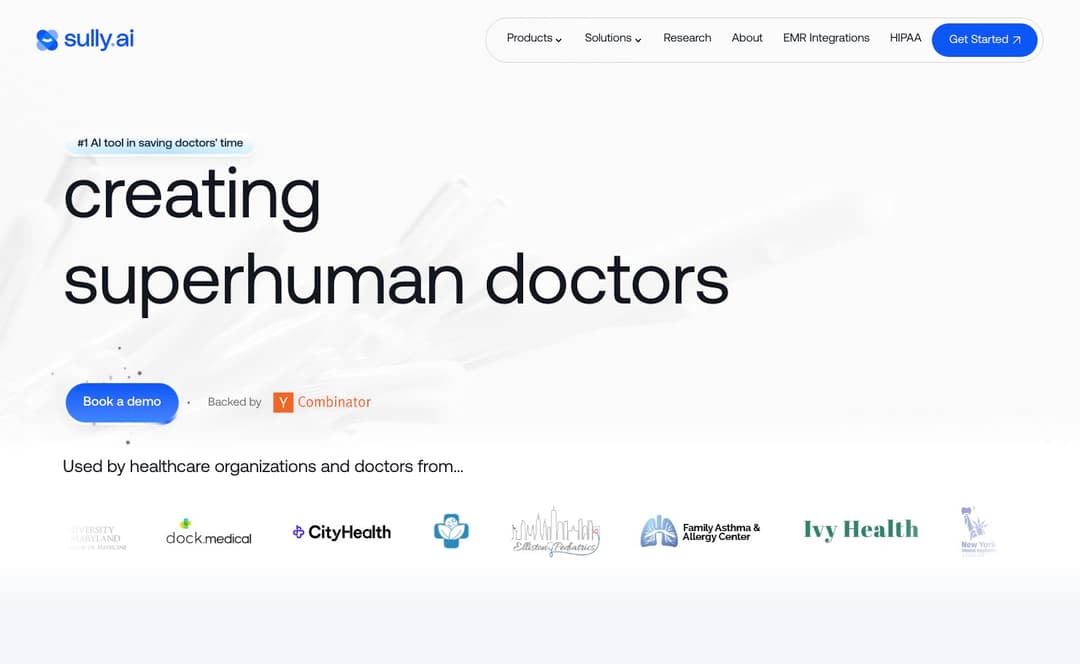
Pricing:
Pricing details not available on the website
Features:
Automates administrative tasks for doctors
Customized AI-generated questions based on each patient's history
Easy integration with Electronic Health Records (EHR)
Pros:
Reduces time spent on administrative tasks by doctors
Enhances doctor-patient interaction
Improves efficiency in healthcare settings
Cons:
Specific details on limitations or challenges not provided
11. AutoNotes
In the ever-evolving landscape of healthcare, AutoNotes stands out as a beacon of innovation, blending AI Medical Tools with cutting-edge technology to revolutionize the way medical documentation is created and managed. This platform leverages artificial intelligence to streamline the documentation process, making it faster, more accurate, and incredibly efficient. Designed to ease the burden on healthcare professionals, AutoNotes ensures that they can focus more on patient care and less on paperwork, embodying the future of medical record-keeping.
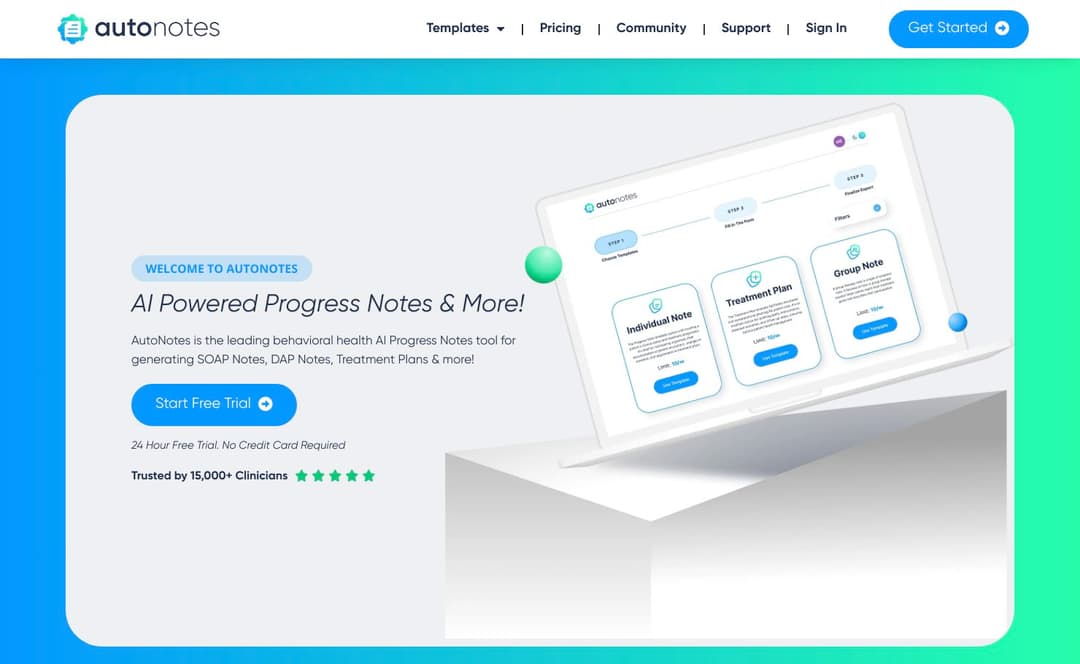
Pricing:
Unfortunately, due to technical difficulties, I couldn't access the specific pricing information for AutoNotes. Typically, AI tools offer a range of pricing tiers based on features, usage, and support options.
Features:
AI-driven documentation automation
Real-time data capture and analysis
Seamless integration with existing healthcare systems
Customizable templates for various medical documentation needs
Secure and compliant data management
Pros:
Significantly reduces time spent on documentation
Improves accuracy and consistency of medical records
Enhances patient care by allowing more focus on patient interaction
Easily integrates with existing healthcare systems
Cons:
May require initial training for optimal use
Dependence on technology raises concerns about data security
Potential for errors in AI-generated content without proper oversight
12. Clinical Notes AI
Clinical Notes AI is at the forefront of revolutionizing medical documentation with its cutting-edge AI Medical Tools. Designed to address the pervasive issue of clinical burnout, it offers an efficient, accurate way to manage patient notes. By capturing every nuance of patient conversations, it enables healthcare professionals to focus more on patient care rather than administrative tasks. Its intuitive platform is tailored to reduce note-taking time significantly, making it an indispensable tool for a wide range of medical specialties.
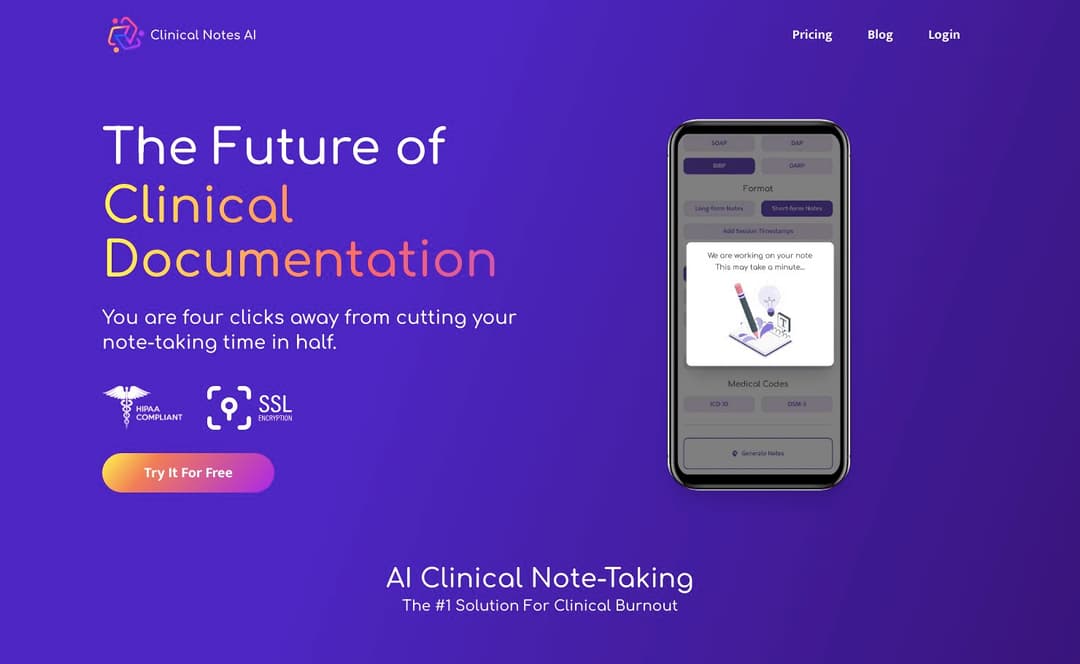
Pricing:
Free Plan: $0/mo with 10 Dictation Credits / Week, 10 Live Session Credits, 2 Document Credits
Dictation Plan: $15/mo with Unlimited Dictations, 20 Live Session Credits / Month, 2 Document Credits / Month
Plus Plan: $30/mo with Unlimited Dictations, 40 Live Session Credits / Month, 5 Document Credits / Month
PRO Plan: $50/mo with Unlimited Dictations, Unlimited Live Sessions, Unlimited Documents
Features:
HIPAA-compliant speech-to-text technology
Customizable note templates tailored to specialty needs
Efficient documentation with a quick turnaround from session to EHR submission
Live session and dictation capabilities for real-time note-taking
Pros:
Significantly reduces note-taking time, combating clinical burnout
Customizable to fit specialty-specific documentation needs
Easy to use with a minimal learning curve
Cons:
Dependent on the quality of speech recognition in noisy environments
Initial setup and integration with existing systems may require effort
13. Mediscribe
Mediscribe stands as a beacon of innovation in the realm of AI Medical Tools, offering an advanced solution designed to streamline the workload of healthcare professionals. By harnessing the power of artificial intelligence, Mediscribe empowers doctors and nurses to focus more on patient care rather than getting bogged down by administrative tasks. This HIPAA & PIPEDA compliant tool not only reduces burnout but also enhances efficiency across the medical documentation process.
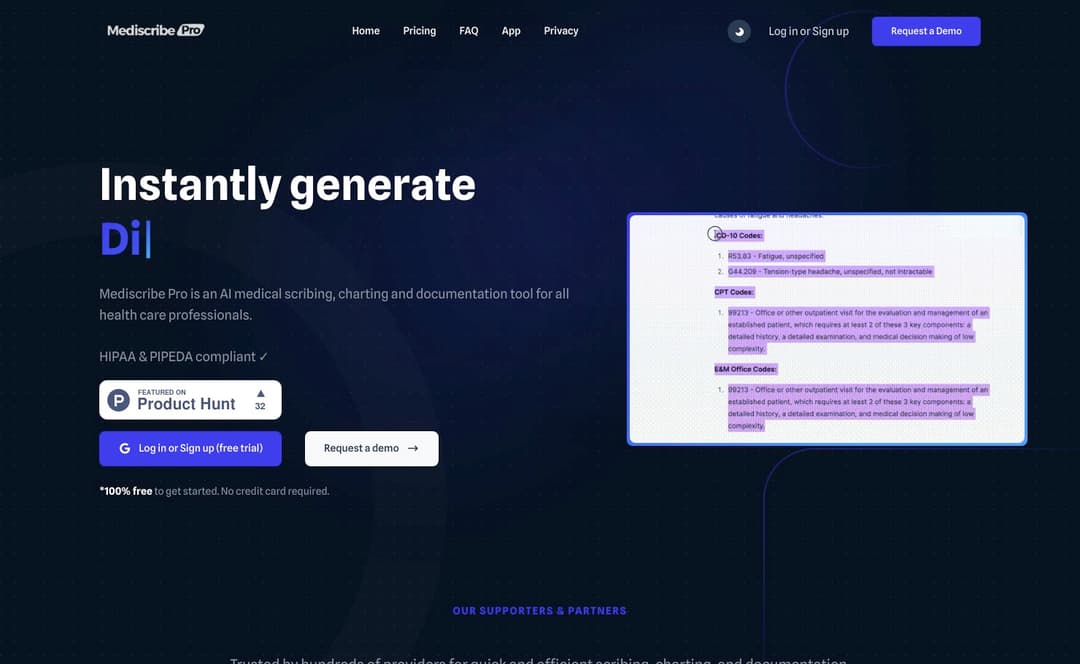
Pricing:
Free: $0 per month with 20 uses, basic support
Pro: $99 per month with unlimited uses, advanced features including dictations, transcriptions, in-person and recording scribes, clinical decision making, 100+ medical templates, and premium support
Custom: Tailored for larger clinics and hospitals with full feature access, exclusive enterprise tools, billing and revenue cycle management, custom integrations, priority support, and training
Features:
Reduces administrative burden, significantly cutting down on clinician fatigue
Built for efficiency, generating notes in under 10 seconds and automatically extracting medical codes
Seamlessly integrates into existing workflows, requiring no installation for EMR systems
Offers a vast selection of medical templates for various specialties
Facilitates live-patient conversations and medical case details for note generation
Enables additional note-taking through conversational interaction
Pros:
Significantly reduces time spent on medical documentation
HIPAA & PIPEDA compliant, ensuring data security and privacy
Versatile, with over 100 medical templates for customized documentation
Improves clinical efficiency by reducing administrative tasks
Offers a free plan for users to experience its benefits
Cons:
Direct EMR integration not currently available
Might require adaptation period for users to fully utilize all features
Summary:
In the ever-evolving landscape of AI Medical Tools, various innovative solutions have emerged to streamline medical documentation and enhance patient care. From Freed's efficient medical scribing to DeepScribe's real-time processing of patient encounters, these tools aim to reduce administrative burdens on healthcare professionals, allowing them to focus more on what truly matters – patient well-being. By harnessing the power of AI, these tools are revolutionizing healthcare by improving accuracy, efficiency, and overall healthcare experiences. As technology continues to merge with healthcare, embracing these AI Medical Tools can pave the way for a brighter, more patient-centric future in the medical field.